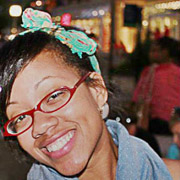Co-ops preserve affordable housing in rapidly changing neighborhoods
Christina Sturdivant |
Tuesday, February 11, 2014
This winter, while there has been no heat circulating through Brenda Jordan’s two-story apartment, a $6 million check from the District government has kept her heart warm and hopes high for her Northeast cooperative.
Jordan has lived in Ward 7’s Pleasant Park neighborhood for over 30 years. Residents within the complex, comprised of sixty units within 5 buildings, have had their share of less than pleasant experiences over the past few decades. With renovations in sight for spring 2014, Jordan can finally picture change.
“I’ll have a breakfast bar, washer and dryer and an open-concept space,” says Jordan, president of the Pleasant Park Cooperative. “And I won’t have to worry about heat, because there will be a new radiator system.”
Jordan’s journey to renovation is a seven-year ordeal that began when tenants of the fully occupied complex were told that their homes were up for sale.
“They said they wanted to make condominiums, but we would have first preference to buy,” says Jordan.
The Tenant Opportunity to Purchase Act (TOPA) was formed as a means to advocate for long-time residents of developments who could become displaced from their homes. When a landlord decides to sell a property, he or she must give tenants a chance to purchase the property before selling it to an outside third party. In order to purchase, tenants must unite to from an incorporated cooperative, which then has up to 45 days after receiving the offer to sale, to deliver a statement of interest and application for registration.
Each Pleasant Park household was offered $500 - $1,500 to give up their right to collectively purchase the property, but Jordan knew that her life in the city was worth more.
Using her 17 years of experience in union negotiations, Jordan knocked on doors and spoke with neighbors to rally the 50 percent participation needed to form a cooperative. It took two months to incorporate the association, submit the letter of intent to purchase and receive a $4.7 million low-interest loan from the Department of Housing and Community Development (DHCD) to purchase the property.
As owners, Jordan hopes that members of the cooperative can create legacies in the community, which boasts proximity to historic D.C. landmarks like Marvin Gaye Park. She plans to pass down her apartment to her son, who was two years old when they moved there in 1976.
Jordan credits much of her cooperative’s success to non-profit developer Mi Casa, Inc.
“They have been in the corner for me since they started the process and have come to the forefront and lobbied on our behalf,” says Jordan.
The fabric of the community
Currently, Mi Casa’s TOPA program is working with 12 cooperative associations in the District. Their work spans conducting feasibility studies, acquiring financing and hiring of architects and contractors for renovations (as at Pleasant Park).
"We would be under someone else’s thumb paying rent."
“It’s very hard to take a project through this and it’s a big commitment for the tenants and for our resources, as well,” says Heather Crouch, Mi Casa program associate. “To go through it not knowing if the funding is going to be available is definitely a struggle.”
On average, the entire process from ownership to renovation takes cooperatives three to six years, says Crouch. With the city recently committing to always have TOPA funds available, she’s hoping success continues for residents who, if not given the opportunity to purchase their buildings, would not be able to find equivalent rents in the city.
“It really adds to the fabric of the community to have people who have been long-term D.C. residents staying here,” says Crouch.
Gale Vargo moved into an efficiency on Colorado Ave. NW in Brightwood thirty-three years ago, when rent was $180 a month.
Two years ago, Vargo and her neighbors were blindsided by the notice that their 28-unit affordable housing complex was up for sale.
“He tried to sell it from under us and posted the paperwork in the basement, hidden by the laundry room,” says Vargo of her former landlord.
When the tenants got wind that the property was up for sale, they immediately formed an association, with Vargo as one of its founding board members. Their letter of intent to purchase was filed in a week.
Working with Mi Casa, the Colorado Cooperative became owners of the property in March 2013.
“If it hadn’t been for Mi Casa, we would be under someone else’s thumb paying rent,” says Vargo.
“The main reason we fought for this building is to keep it affordable housing," she says. "For at least 40 years, no one can buy the building and it has to stay affordable housing.”
The Brightwood neighborhood has seen much change over the past three decades. After a nearby club was shut down a few years back, Vargo has felt safe and comfortable in her neighborhood. And with the new Walmart on Georgia Ave one block away, necessities are becoming more accessible for residents.
Vargo, who recently became president of the co-op, says her most valued asset has become her patience as a leader.
“It’s hard. I get calls all the time and tenants knocking on my door,” she said. “But not having to deal with someone else owning where we live is a really wonderful feeling.”

Christina Sturdivant is a native Washingtonian who's always watching and writing about the latest cultural, community and innovative trends in the city. She's interested in people and companies that create equitable opportunities for longtime residents and transplants alike.